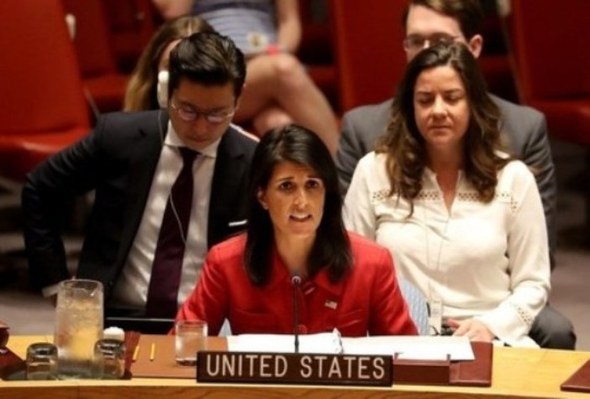Posted on : Dec.1,2017 21:24 KST
Modified on : Dec.1,2017 21:41 KST
 |
|
US Ambassador to the UN Nikki Haley speaks at an emergency meeting of the United Nations Security Council on Nov. 29 following North Korea’s launch of the Hwasong-15 ICBM. (EPA/Yonhap news)
|
Since North Korea’s launch of a Hwasong-15 ICBM earlier this week, the US has been calling ever more vociferously for tougher sanctions on the North. During a telephone call with Chinese President Xi Jinping on Nov. 29, US President Donald Trump reportedly asked Xi to suspend the supply of crude oil to North Korea. A remark made by US Ambassador to the UN Nikki Haley during an emergency meeting of the UN Security Council that same day suggests that Trump cranked up the pressure on Xi: “China can do this on its own, or we can take the oil situation into our own hands.”
It is obvious that cutting off the supply of crude oil would inflict severe pain on the North Korean regime. But it is not realistic to assume that China and Russia will cooperate to the extent desired by the US. These countries have different strategic interests, after all. Furthermore, it is not the North Korean leadership, but rather the man on the street, who will suffer if the flow of oil is cut off. And it is wishful thinking to assume that this will cause the regime of Kim Jong-un to give in and give up its nuclear weapons. Cutting off the oil supply is no panacea, and furthermore it is likely to just aggravate the situation.
"The dictator of North Korea made a choice yesterday that brings the world closer to war,” Haley said. While this was intended as a warning to North Korea, it is troubling that the word “war” has been used time and time again. There must never be another war on the Korean Peninsula. War cannot be justified under any circumstances.
On Nov. 30, Japanese newspaper the Yomiuri Shimbun reported that Trump said during his meeting with Japanese Prime Minister Shinzo Abe in Japan last month that the US would never tolerate ICBMs and that it would do anything to protect Washington, New York and Los Angeles. This has apparently caused some members of the Abe administration to worry about the US launching a preemptive strike on North Korea. If war breaks out, Japanese government officials believe, Japan is likely to be a target of North Korean retribution.
If the Japanese are worried, it hardly needs to be said that South Koreans should be, too. Recent remarks made by Richard Haass, president of the Council on Foreign Relations, are significant: “What's needed is a serious diplomatic effort to freeze weapons testing… The Trump administration should make clear what it is willing to offer in exchange for such a freeze, whether sanctions relief, a formal end to the state of war or an adjustment to US–South Korean military exercises.”
Even at this stage of developments, the US is blaming China for not participating in sanctions, and China is criticizing the US for not participating in enough dialogue. Meanwhile, the US calls on China to shut down its supply of crude oil, while China asks the US to accept its proposal for a “freeze-for-freeze” (the US and South Korea suspending their joint military exercises, and North Korea halting its nuclear weapon and missile testing). This isn’t working.
As a first step, the US needs to lower the threshold for dialogue with North Korea. The Trump administration needs to pay heed to the observation that, so far, it has never seriously tried dialogue with the North. Equally important, China needs to respond more vigorously to the international community’s call for engagement with the North. If the US and China keep passing the buck as they’re doing now, no solution will be found.
Please direct questions or comments to [english@hani.co.kr]






